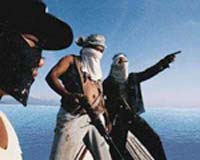Jackson MbuviNairobi
IN A POLICY STATEMENT TO THE United Nations Security Council early in the month, Secretary-General Ban Ki-moon made a passionate case for the formation and facilitation of a "coalition-of-the-willing" as a lasting solution to the crisis in Somalia.
Such a coalition, in UN-speak, refers to a group of like-minded countries that take action in a trouble-spot on authority of the United Nations, but not under UN control. This is opposed to UN peacekeeping troops.
So is there a "coalition-of-willing" ready to venture into the troubled Horn of Africa nation?
The answer is yes. Already there is Ethiopia which last year sent fighter jets, tanks and thousands of troops to oust the Union of Islamic Courts (UIC), and re-instal in power the UN recognised Transitional Federal Government (TFG).
Then there is Uganda, which was among the five African nations that early in the year pledged to send a peace-keeping contingent to Mogadishu. Kampala has since kept its word.
TO COMPLETE THE TEAM ARE THE likes of Nigeria, Ghana, Burundi, and Malawi, which pledged to send troops, but are yet to do so.
Why then the continued bloodshed in Mogadishu when there is a coalition willing to help? Apparently, with all its good intentions, the "coalition-of-the-willing" has not delivered for diverse reasons.
To start with, Ethiopia, though it did a fantastic job in routing the UIC, bungled on the transition programme. Apparently, the Ethiopians underestimated the ability of the Islamists to regroup, and sent back home two-thirds of the contingent that defeated the militants.
With the TFG under-capacitated by the withdrawal of the Ethiopians, the UIC returned to the streets, this time not as an organised army, but as snipers. But they are just as deadly.
As for Uganda, a 1,500-strong contingent was dispatched to Mogadishu all right, but for the wrong reason. It was sent on a peace-keeping mission when there was not yet any peace to keep!
As the president of the UN Security Council, Mr Emyr Jones Parry, put it early in the month, Somalia is a country at war, hence there is no point talking about peace-keeping in Mogadishu.
That explains why 1,500 people have been slaughtered and 400,000 others - actually nearly half the population of Mogadishu - fled the capital as Uganda troops watched helplessly.
Their strict instruction as peace-keepers is: Don't fire unless you are fired at. Indeed, their first act on landing in Mogadishu was an MoU with the Islamists in which either side vowed to keep off the other and there would be no problem.
The case of the other three in the "coalition-of-the-willing" - Ghana, Malawi and Burundi - is equally pathetic. Much as they are willing to help, they are handicapped in terms of resources. While each has set aside at least 1000 troops for the Somalia mission, none has done so on account of logistics.
The last in the coalition, Nigeria, has a unique problem. It has the capacity to send troops to Mogadishu, but it won't do so because Abuja is unhappy that Ethiopia is the country calling the shots in the Somalia affair.
Nigeria's problem is one of ego. The continent's most populous and oil-rich country always likes it when it is leading from the front!
But when all is said and done, and in the words of Secretary-General Ban Ki-Moon, a "coalition-of-the-willing" still remains the most viable approach to the Somali imbroglio.
The way forward now is for the "coalition" to have a clear mind as to what is needed in Somalia and the guts to do it.
Second, such a coalition should be fully facilitated, and, third and very important, that it be willing to stay on in Somalia until the mission is accomplished.
THE CORE OF THE PROBLEM IN Somalia is lack of a central authority with enough muscle to contain the numerous warring clans and sub-clans. Since the TFG is the internationally recognised authority, it must be enabled to rout the clan and sub-clan militias.
Second, the TFG should be facilitated to bring all the willing to the negotiation table and draw a road-map for the return of sanity in Somalia.
This will require patience. After 16 years of mayhem, two-to-three years helping Somalis put their country back on the rails is not asking too much.

Mr Mbuvi is a consultant on security matters.
























